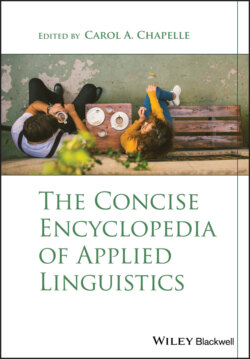Читать книгу The Concise Encyclopedia of Applied Linguistics - Carol A. Chapelle - Страница 42
Research Into Agency in L2 Learning and Teaching
ОглавлениеPrompted by the social turn, empirical studies from social perspectives on agency (often with this word appearing in the title) have investigated L2 learning and teaching, indicating growing interest in the social and complex nature of agency among SLA researchers. Norton's (2000) study used the concept of agency, although she did not use the term “agency” itself. Drawing on Bourdieu (1977) and Weedon (1997), among others, she demonstrated how newcomers to a country are deprived of opportunities to use and practice the L2, or the “right to speech” (Bourdieu, 1977, p. 75), even though they are invested in learning the language in order to secure better life opportunities. Based on interviews with five immigrant women as well as their diaries, the study depicted their struggles and their agency in fighting for secure positions in society while learning to claim the right to speak in the L2.
A recent example following this line of research is Miller's (2014) study of immigrant small business owners in the USA, which showed how their agency was discursively exercised (or not) while they were learning and using an additional language in their everyday lives. Also, studies on agency in instructed foreign language (FL) settings (e.g., Gao, 2010; Mercer, 2011) are appearing. Aro's (2016) longitudinal study followed the long, winding development of agency in two Finnish learners of English for 12 years in both instructed and uninstructed settings. An anthology aiming to theorize and analyze agency in SLA (Deters, Gao, Miller, & Vitanova, 2015) containing 13 separate studies showcases researchers' initiatives to enlist a wide range of theoretical perspectives in order to understand agency in SLA. Theories range from sociocultural approaches, including Bahktin's dialogism (with a chapter by Dufva & Aro), language socialization (Duff & Doherty), and positioning theories (Kayi‐Aydar) to poststructural, postcolonial viewpoints (Bagga‐Gupta on women working in nonprofit organizations in Mumbai as well as Lin on Taiwanese indigenous language education), and critical realism presented by Block as a new theoretical perspective for exploring structure and agency. Authors represented in this volume chose discourse analysis and ethnography as their preferred methods for examining agency as negotiated in discourse, while new methodological possibilities are also explored, including autoethnography and linking linguistic and interview data. Separately, many studies discuss how agency is exercised differently by the same person in different contexts, for example, instructed versus community (Miller, 2014) or changing positions vis‐à‐vis others in the classroom (Kayi‐Aydar, 2015b). Kashiwa and Benson's study (2017) of Chinese students in a study‐abroad context also highlights how environmental constraints and affordances change how learners exercise agency.
Another notable recent trend is an increase in research into teacher agency from broadly social perspectives (e.g., Ruohotie‐Lyhty, 2011; Feryok, 2012; Kayi‐Aydar, 2015a, 2015b; White, 2018; Ishihara, Carroll, Mahler, & Russo, 2018). With an increased understanding of how teachers' exercise of agency is linked to how effective they can be in instructional conditions (Kayi‐Aydar, 2015a), language teachers' agency has attracted the attention of both researchers and practitioners. From this perspective, teacher agency is viewed as a complex concept influenced by various factors, such as how teachers view their students, themselves as teachers, education in general, their own profession, and the professional relationships that are formed within their particular environment (Priestley, Biesta, & Robinson, 2013). In an anthology dedicated to this theme (Ng & Boucher‐Yip, 2017), researchers focus on how a language teacher's agency structures and is structured by the curricular policy and education reform imposed by the government. With teachers being the agents who negotiate, accept, or deny, and introduce educational policy into the classroom by converting these into instructional practices, studying how teachers both translate and implement policies in actual classrooms and what effects their ways of doing so have on their teaching is shown to be useful in understanding the language‐learning classroom.
